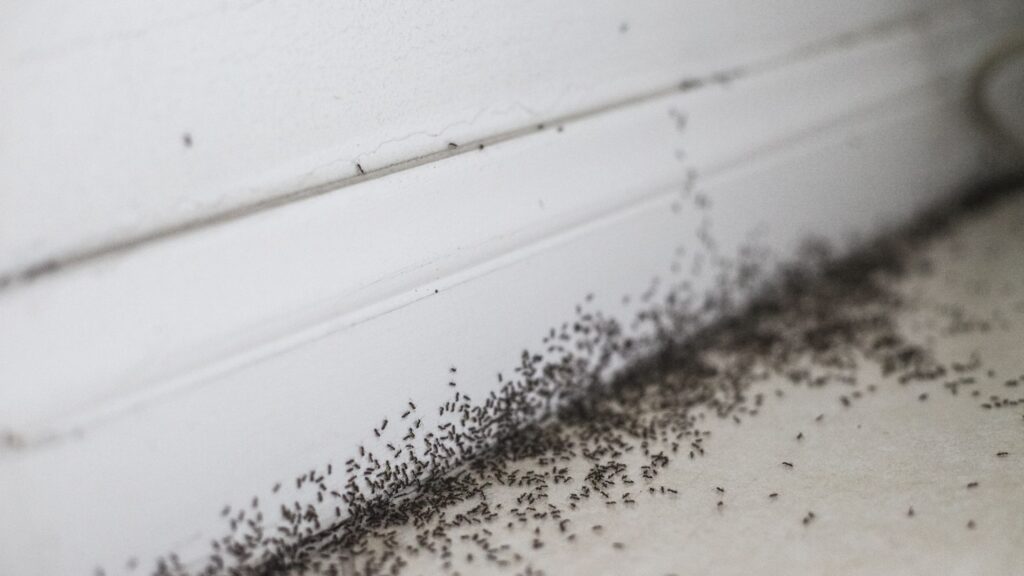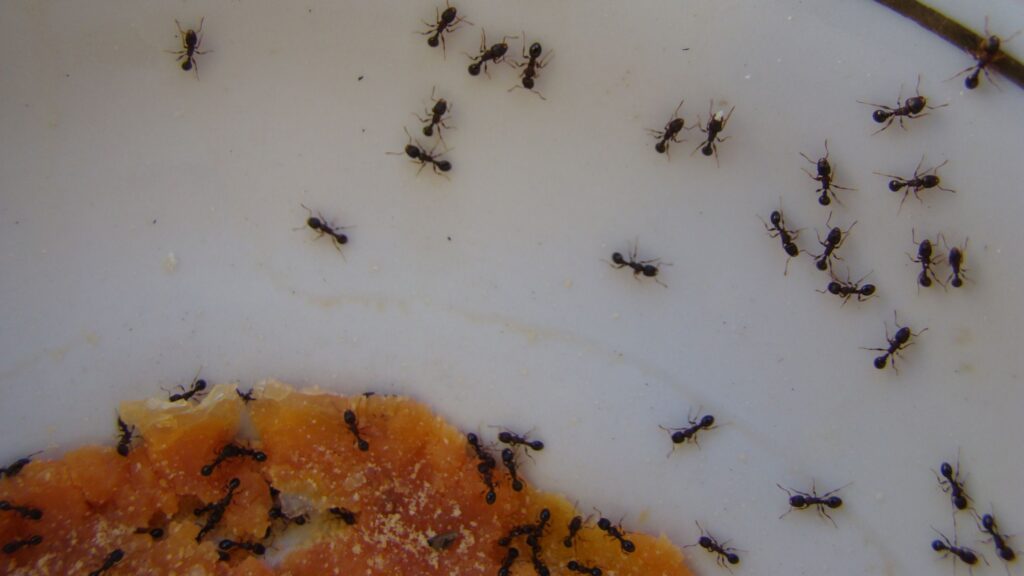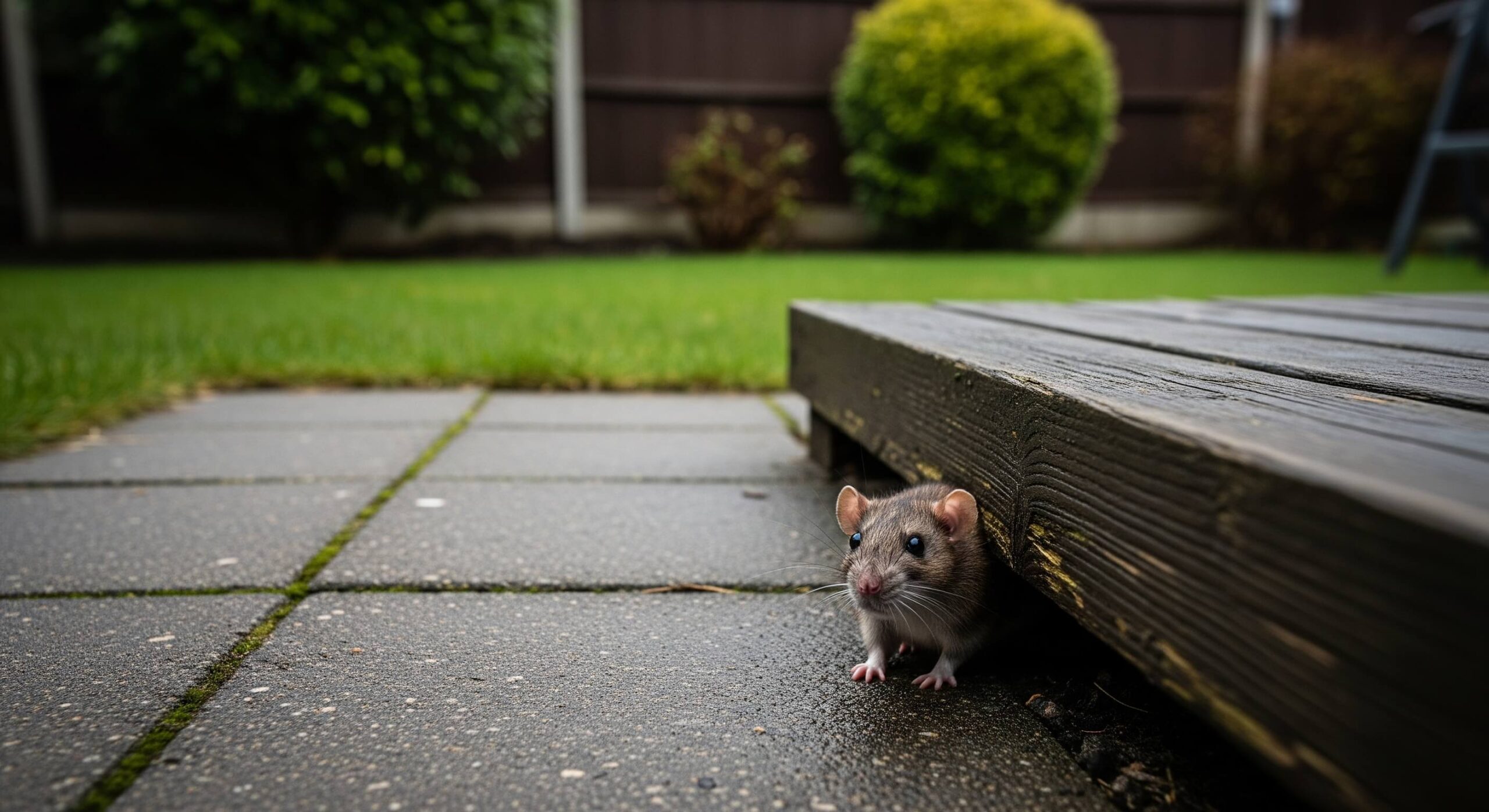In Glasgow, East Kilbride, and nearby towns, summer doesn’t just bring longer evenings and BBQs, it brings ants! If you’ve noticed a steady trail of ants heading straight for your kitchen cupboards, you’re not alone. We see a spike in calls about ants every year as soon as the temperatures start to rise.
This guide will help you understand why ants are sneaking into your kitchen, what you can do to stop them, and when it’s time to call in the professional pest control technicians at Strathclyde Pest Control.
Why Are Ants in My Kitchen?
In the UK, the black garden ant (Lasius niger) is the usual suspect when it comes to kitchen invasions. Once summer kicks in, these tiny scavengers become noticeably more active and kitchens are top of their places to visit. Why? It’s because much like us humans they like places that are warm and dry and of course full of sugary snacks and leftovers. Add to that we often leave out crumbs, bits of pet food and other leftovers. It is basically a banquet for ants so they love to make a headline for any kitchen.
Ants don’t just wander in aimlessly. They are fascinating and clever creatures, they send out scouts to find food, and when one hits the jackpot, it leaves a pheromone trail back to the colony. The rest follow, forming the neat little ant trails we all recognise. This is why, once they’ve found your biscuit tin or that sticky spot behind the bin, they’ll keep coming back until the source is removed.
As we said earlier we get lots of extra ant related calls the moment the warm weather arrives. As we are in Scotland though these warm weather periods are quickly followed by wet spells also they also play a part. After heavy rain, ants may retreat to dry indoor areas for shelter and to escape their flooded nests. So those gaps in your door frames, the cracks in bricks or masonry on your house, or even broken sealant around pipes can all serve as structural entry points for these clever little guys.
If you store cardboard boxes, pet supplies, or food packaging in garages or garden sheds, keep an eye out there too. These undisturbed areas can be just as inviting for ants to nest in or forage through.

Signs You Have an Ant Infestation
Noticing a few ants? That may be just the beginning. Here are the most common signs of an ant invasion:
- Steady ant trails leading from cracks and crevices into your kitchen
- Ants emerging from holes in-between walls, flooring spaces and sometimes even plug sockets.
- Rat droppings and signs of other differnet pests attracted by leftover food
- Flying ants near windows (these are a telltale sign of a mature colony)
- Tiny piles of soil near skirting boards — a sign of nesting activity
- Ants found in unexpected places like garden storage boxes, pantries, or even under appliances where warmth and moisture collect

DIY Steps You Can Take to Control Ants in Your Kitchen
Many residents in Glasgow and Strathclyde will try to tackle their ant issues themselves, and as long as your ant infestation has not gotten out of control you can be succesful! Many try natural ant repellents before calling in professional pest control, what are they?Here are a few you can try to keep your ants at bay…
- Keep all surfaces clean and free of crumbs and other food residue
- Keep food like cereals, dry ingredients like flower and pet food in sealed airtight containers. A simple tin might not be enough for determined ants
- Avoid storing food in lower cupboards or on counter tops
- Rinse food packaging before placing in recycling
- Empty bins frequently then sweep and mop around the bin area
- Use vinegar to disrupt pheromone trails — white vinegar or apple cider vinegar works well
- Block entry points using sealant around pipes, skirting, and window frames
- Place ant bait stations where activity is high, but avoid placing near children or pets
- Trim back garden vegetation touching exterior walls
- Keep external doors shut during peak ant activity
- Watch out for new ant trails forming after rainstorms
Trying some of these simple methods could help reduce or even stop an ant infestation in your Glasgow Kitchen or nearby home. What though if you find despite your best efforts you sill cannot seem to stop the ants. Well that leads onto our next question… when should you call a pest control professional to deal with ants and their nesting areas?
When to Call a Professional Pest Control Company… Like us!
DIY solutions only go so far. You should call a professional pest control company if:
- You spot ants regularly despite using bait or vinegar
- Ants are seen in the loft insulation or electrical sockets
- The infestation returns after treatment
- You run a food business or live in shared accommodation
- You’re concerned about potential structural damage or contamination
- You suspect a well-established colony that’s not responding to bait
Professional pest control offers more than just surface fixes — it tackles the root of the colony. Technicians can trace pheromone trails to the nest and apply bait that’s carried directly to the queen and developing brood.
How Our Ant Control Services Work
Strathclyde Pest Control provides tailored ant control services throughout Glasgow, East Kilbride, Cambuslang, Newton Mearns, Giffnock, Clarkston, and nearby areas:
- A professional pest control technician inspects the property, including kitchen units, lofts, crawl spaces, and wall voids
- We use professional-grade bait solutions designed to be carried back to the ant colony
- Treatments are discreet, safe for pets, and effective at reaching hidden nests
- We offer solid advice and preventative measures to avoid future infestations
- If needed, we advise on habitat modification, such as managing water leaks, food storage practices, and blocking accessible nesting sites
- We follow NPTA best practices and comply with all local pest control regulations
Our team is fully licensed and trained, we can use our experience to help with all types of ant species and any other household pest issues you might have such as Wasps or Rats
Final Tips to Keep Ants Away
- Clean up spills immediately, especially sugary drinks and pet food
- Ensure no food sources are left accessible overnight
- Keep water leaks under control to reduce moisture
- Inspect decking and garden areas for signs of ant activity
- Install barriers at potential entry points, especially in older properties
- Trim vegetation touching exterior walls, which can act as a bridge
- Repair structural entry points around the house to discourage entry
- Use natural ant repellents like lemon juice or essential oils as routine maintenance
- Watch for new ant trails forming along skirting and worktops
- Schedule regular inspections to detect new activity early
- Be mindful of food storage in outdoor buildings and garden sheds
Preventative measures like these, combined with expert pest control, provide long-term results.
FAQs: Ant Infestations in the UK
Got some more questions? Here are some commonly asked Ant infestation questions we get asked.
Q: Why are ants appearing out of nowhere in my kitchen?
A: Ants follow pheromone trails laid by foragers. Once one finds food, the rest quickly follow. Warm weather and crumbs make your kitchen a top target.
Q: How do you get rid of summer ants?
A: Clean thoroughly, seal up entry points, and use bait stations. If ants persist after 7–10 days, it’s time for professional pest control.
Q: What are black ants and are they harmful?
A: Black garden ants are common culprits in the UK. While not dangerous, they are unwanted guests and can contaminate food and kitchen surfaces.
Q: Are ant sprays from supermarkets effective?
A: Not always… Sprays only kill visible ants and don’t target the colony. Bait is more effective long-term.
Q: Do ants damage houses?
A: In the UK, serious structural damage is rare, but colonies can live in wall gaps and voids along with lofts, this can cause insulation damage and hygiene issues.
Q: I rent a flat in Glasgow — who’s responsible for pest control?
A: If the infestation is due to structural problems or potential entry points, it may be your landlord’s responsibility. Poor hygiene may shift liability to you.
Q: Do you deal with garden ant problems too?
A: Yes. We handle infestations in garden spaces and recommend solutions to keep ants from re-entering your home.
Q: What areas do you cover?
A: We serve Glasgow, East Kilbride, Rutherglen, Cambuslang, Newton Mearns, and all areas within 12 miles of East Kilbride.
Q: Why do ants suddenly appear after rain?
A: Rain floods their nests, driving ants indoors where it’s dry and there’s greater access to food sources.
Q: Are ants dangerous in the UK?
A: Most UK ants are more annoying than harmful, but they can contaminate food, damage soft items, and some species can impact wood structures.
Q: What’s the best natural ant repellent?
A: Vinegar, lemon juice, and essential oils can act as natural ant repellents, especially for minor kitchen invasions.
Q: How fast can a colony grow?
A: Black garden ants are prolific breeders — in summer, a single colony can produce thousands of ants in a short period of time.
Q: What should I expect from a pest control visit?
A: An inspection, targeted baiting, sealing of entry points, and advice for prevention. Most treatments resolve infestations quickly, with follow-up only if needed.
Q: Will I need more than one visit?
A: In severe infestations or large properties, we may recommend an additional visit, but many are resolved in one session.


